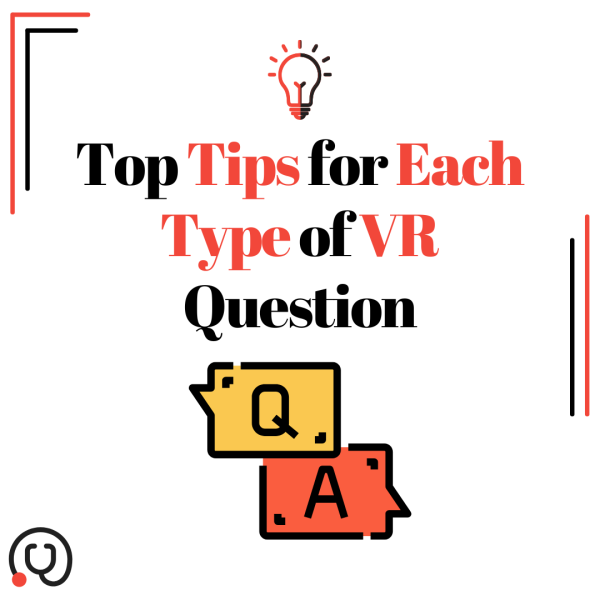Top Tips for Each Type of Question in UCAT Verbal Reasoning

11 months ago by Chris
There are two main types of questions in UCAT Verbal Reasoning: reading comprehension and True/False/Can’t Tell.
UCAT reading comprehension questions involve “making inferences and drawing conclusions from information”, whilst True/False/Can’t Tell questions involve “determining whether the statement follows logically”.
True/False/Can’t Tell UCAT questions are generally easier and less time-consuming than reading comprehension questions. The two question types involve many common skills, so many of the tips provided in this blog will be applicable to both question types.
Find what works for you!
From my experience, UCAT Verbal Reasoning is the section which has the greatest variability in technique. Some people may prefer to read the passage first and some prefer to read the question stem first. Which of these is the correct approach? The answer is – either is completely fine! At the end of the day, what matters is that you do what works best for you.
In UCAT Verbal Reasoning, I read the UCAT question first before skimming over the rest of the passage. My rationale for doing this was that if I were to read the question first, I may notice a keyword crucial to the UCAT question whilst skimming the passage, whereas if I were to read the question after skimming the passage, I may have to go back to locate the keyword. However, practicing both strategies and finetuning your own technique will help you find an approach that works for you.
Skip Reading Comprehension questions when necessary
UCAT True/False/Can’t Tell questions tend to be easier to answer correctly in a given timeframe. If you find yourself consistently being unable to finish the UCAT Verbal Reasoning section in time, you can try skipping harder UCAT reading comprehension questions. It isn’t worth spending extra time on more difficult UCAT reading comprehension questions when you could answer multiple True/False/Can’t Tell questions in the same amount of time. You can return to the more difficult UCAT reading comprehension questions later and make an educated or strategic guess.
Make educated guesses
At some point in the UCAT Verbal Reasoning subtest, you will find that you have narrowed down a question to two remaining answer options. In this situation, you have to be able to gauge whether investing additional time into answering the UCAT question correctly is worth it, or if making an educated guess and investing your time elsewhere would be wiser. Knowing how to manage your time is key to all sections of the UCAT, but most students find themselves struggling the most with this in UCAT Verbal Reasoning. As such, don’t be afraid of making educated guesses, as you will likely be able to answer more UCAT questions correctly in the long run.
Understand the passage
When completing UCAT reading comprehension questions, your task is not only to pinpoint where the relevant information is. You also need to gain a deeper understanding of the passage as a whole in order to answer the questions accurately. Really trying to process and understand the information in the passage when reading it will often allow you to easily locate the relevant information for the following UCAT questions in the same question set. Also, when you really understand and engage with a passage, more difficult UCAT Verbal Reasoning questions (such as author’s opinion or inference questions) become far easier to answer.
Look out for definitive words
Some words used in True/False/Can’t Tell questions may be too definitive, and generally make the UCAT question easier to answer. For example, if a question uses words such as ‘always’, ‘never’ or ‘all’, it will be easier to prove/disprove a statement. For example, ”All Roman soldiers were given financial compensation during the war” is likely to be incorrect because the word ‘all’ is definitive. The reason for this is that we need a high level of proof to be able to definitively say that the statement is true for all Roman soldiers. If a single Roman soldier was not given financial compensation, then we can confidently answer that the statement is not true.
Focussing on these definitive words will allow you to answer these questions quickly and accurately.
Use UCAT skills trainers
For both question types in UCAT Verbal Reasoning, being proficient in speed reading, finding keywords, and drawing inferences from the passage is essential. An extremely good tool for improving your speed-reading and keyword-scanning skills is the MedEntry Skill Trainers.
The MedEntry speed-reading trainer helps to reduce subvocalisation, regression and improve your ability to read groups of words together (chunking). It trains students to actively practice good speed-reading habits.
The keyword scanning trainer is especially useful for True/False/Can’t Tell questions, where keyword-scanning is likely to be more useful compared to reading comprehension questions.
Personally, I found the Skill Trainers especially useful in my preparation as they helped motivate me to improve through the provision of a scoring, achievements and leader board system, whilst also being presented in a fun and intuitive manner.
Many more strategies for answering UCAT Verbal Reasoning True/False/Can’t Tell and reading comprehension questions are available in MedEntry’s UCAT Courses.


